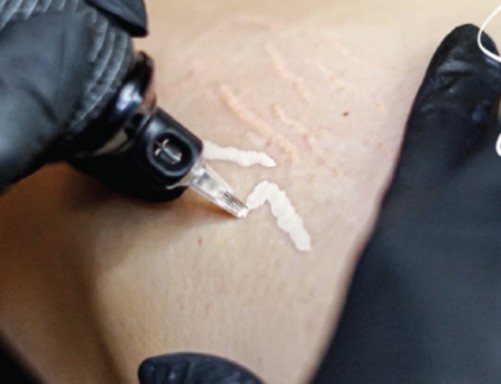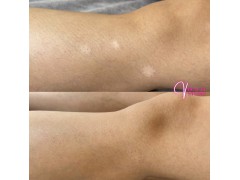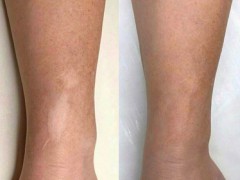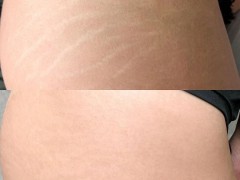Duration: 2–3 hours (depending on the size of the area and skin tone)
Pricing: Varies by treatment area (inquire for a personalized quote)

- Safe and Hygienic Process: Your safety is my top priority. I use only high-quality pigments and disposable needles, single-use instruments to ensure a clean and sanitary procedure.
- Conceals Imperfections Naturally: Camouflage tattooing blends scars, stretch marks, or discoloration with your natural skin tone, making imperfections less noticeable.
- Boosts Self-Confidence: Restores a more even and uniform appearance to your skin, helping you feel confident and comfortable.
- Provides Long-Lasting Results: The pigments used are designed to last, offering semi-permanent to permanent solutions with minimal upkeep.
- Personalized to Your Skin Tone: Each treatment is customized to match your exact skin tone, ensuring a natural and seamless look.
- Enhances Overall Appearance: Whether it’s minimizing scars or blending uneven tones, camouflage tattooing helps you achieve a more polished and even complexion.
- Allow Greater Freedom: Feel confident in your appearance and enjoy wearing what you like without worrying about visible skin imperfections.
Camouflage Tattoo Works Best on:
- Stretch marks (must be at least 2 years old)
- Scars from medical and elective surgeries
- Self-harm scars
- Scars from procedures like thigh lifts, tummy tucks, breast surgeries
- Burns
- Skin grafts
- Transition scars
- Vitiligo & Hypo-pigmentation
- Deep lines & wrinkles
By following these pre-care steps, you ensure that your skin is in optimal condition for the procedure, allowing for better pigment retention, faster healing, and the best possible results.
4 Weeks Before Your Appointment:
• No laser treatments, microneedling, or chemical peels on the treated area.
• Avoid excessive sun exposure and tanning beds—skin must not be sunburned or irritated.
2 Weeks Before Your Appointment:
• Discontinue the use of retinol, glycolic acid, or any exfoliating skincare products on the area.
• No self-tanning lotions or sprays—this can interfere with color matching.
1 Week Before Your Appointment:
• Stay well-hydrated and keep the area moisturized daily for better pigment absorption.
• Avoid any new skin treatments or facials in the area to be treated.
24-48 Hours Before Your Appointment:
• No alcohol, caffeine, or blood-thinning medications (unless prescribed by a doctor) to reduce the risk of excessive bleeding and pigment loss.
• No vigorous exercise before the appointment to avoid increased blood flow to the area.
• If the area is shaved, do so at least 24 hours before to prevent irritation.
Day of the Procedure
• Shower before your appointment, as you’ll need to avoid getting the treated area wet for 24 hours afterward.
• Do not apply lotions, oils, or perfumes on the treatment area.
• Eat a light meal before arriving to avoid feeling lightheaded during the procedure.
• Arrive with clean skin—no makeup, deodorant, or products on the area being treated.
• Wear loose, comfortable clothing that allows easy access to the treatment area and won’t rub against your skin post-procedure.
1. Consultation: We begin with a thorough consultation to understand your skin concerns and goals. We assess the area to be treated and select the appropriate pigment shades.
2. Color Matching: We have revolutionary skin tone device that reads a person’s skin tone.
3. Safety: Your safety is our top priority. We disinfect the area with alcohol before starting and use only disposable needles and instruments, ensuring a clean and sterile procedure.
4. Numbing: Numbing cream is not applied, as the procedure is generally not painful.
5. Application: Using precise tattooing techniques, we apply the pigment to the target area, carefully blending it with the surrounding skin.
6. Aftercare: We provide detailed aftercare instructions to promote optimal healing and long-lasting results.
7. Touch-Up: Since everyone heals differently, a touch-up session may be required. The deeper and darker your stretch marks or imperfections, the more sessions may be necessary. The healing process can vary, typically taking anywhere from 1 week to 3 months.






THE PIGMENTATION WILL GRADUALLY FADE OVER TIME, BUT HEALING PERIOD MAY VARY BETWEEN INDIVIDUALS. WHILE SOME MAY HEAL COMPLETELY WITHIN A WEEK, OTHERS MAY TAKE LONGER. IF THE TREATED AREA REMAINS BROWN, IT INDICATES INCOMPLETE HEALING, SO PATIENCE IS ADVISED AS EVERYONE'S HEALING PROCESS IS UNIQUE.
To prevent any infection, please take your time to read and follow this aftercare.
Dry the area with toilet paper or a fresh, clean towel.
Apply ointment (Vaseline or Aquaphor) 2x per day for 8 weeks (or until your next treatment).
Protect the treated area by always wearing clean, loose shirt/jogging pants.
Removing scabs
Taking immersion baths (swimming pool, beach, bathtub)
Going to saunas
Allowing excessive sweating (workout)
Exposing the area to excessive heat and suffocation (tight clothes)
- THINGS TO AVOID:
- No saltwater, no exfoliation, no laser hair removal or waxing on areas for 14 days
- 1st 30 days, do not use sunscreen, sunblock, self-tanning or any substance that contains vitamin D
- Do not shower with hot water as it may cause irritation for the first few days.
- Do not take vitamin D pills
- If there is any allergic reaction, please call your physician
- Sunbathing is strictly forbidden for the next 30 days.
The treated area may appear red and swollen immediately after the treatment.
After 24 hours, the swelling will subside, but the redness may persist for up to 72 hours.
Following 72 hours, the redness will gradually transition to a brownish tone (hyperpigmentation).
Hyperpigmentation might persist for a period ranging from one to three months.
If the treatment was performed on the legs, the healing process may extend up to six months, especially for individuals with darker complexions.
Please refrain from being alarmed if the hyperpigmentation takes some time to fade; this is a normal part of the skin's healing process. To expedite healing, it's advisable to avoid foods and beverages high in sugar, as elevated sugar levels can prolong the healing process. Instead, focus on consuming vegetables, as many of them possess healing properties (consult your doctor if you have any underlying medical conditions).
Smoking can also impede the healing process.








